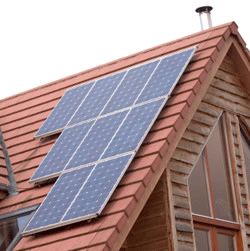On Tuesday, Fannie Mae and Freddie Mac ended their radio silence nine weeks after sending cryptic letters warning lenders against permitting the use of Property Assessed Clean Energy (PACE) — but it wasn’t the follow-up PACE advocates were hoping for.
That’s how Grist writer Jonathan Hiskes began his article about the document posted below: a “clarification” of the quasi-governmental home mortgage programs’ position on how to deal with PACE-financed solar homes.
Fannie and Freddie’s official position is, in a word, “Don’t.”
New rules: A little upside, a lot of downside
There’s slightly more to it, but nothing that changes the thrust of their earlier warnings. The only upside in the new letter is the part that grandfathers in existing mortgages for homes with PACE-financed solar panels. Several advocates of PACE financing have been working to keep the successful program alive within Fannie and Freddie, including the Vote Solar Initiative. Hiskes reviews some of those efforts in his Tuesday article.
For now, however, the outlook for the very successful program does not look good. With financing being the major hurdle to homeowner adoption of clean renewable energy such as solar, a blow to PACE is a blow to a clean energy future.
